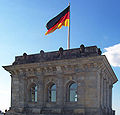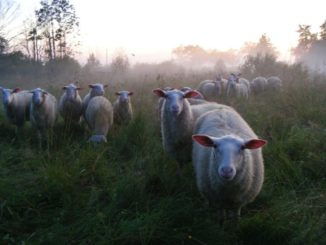
“The CAP provides enough opportunities”
Bulgaria reacts to Commission’s proposals […]

Bulgaria reacts to Commission’s proposals […]

Germany reacts to Commission’s proposals […]

Read comments from members of the ARC group following the release of the CAP proposals, and add your own! […]

Citizens speak out! The status quo is not an option […]

Read further reactions and press releases on the Commission’s proposals […]

Background information and details of the legislative proposals on CAP reform to be made today by the European Commission […]

The Agricultural and Rural Convention 2020 (ARC) is a network open to all those interested in the Future of the Common Agricultural Policy (CAP). The ARC and its members are now contributing actively to the continuing debate on the future of the CAP and believe that policies must change radically in the face of rising challenges. […]

European Parliament’s Dess Report adopted, but falls behind expectations On 25 May, the European Parliament’s Committee on Agricultural and Rural Development (COMAGRI), as expected, has adopted a report setting out its views on the CAP towards 2020. The committee found a compromise position on the huge differences between the political groups about the future of European farmers and rural regions and so avoided a false start into it newly-endowed co-decision powers. That is the good news. The bad news is that the message is not sufficiently concrete or ambitious, and does not respond to the expectations of civil society as laid down in our ARC communication which was published in parallel with Commissioner Ciolos’s reform proposals last year. We are missing a clear statement by the Parliament on how the future Common Agricultural Policy will organise the urgently needed transition towards sustainable farming and food systems, with synergies between plant and animal production, good management of biodiversity, soils and water through crop rotation and a serious reduction of non-renewable inputs like fertilisers, pesticides and oil-based […]

Building our common future: Finalising a “Communication of Civil Society to the EU on the Future of Agriculture and Rural Policies” The first ARC Conference took place on 4-5 November 2010 at the Committee of the Regions in Brussels. After two rounds of consultation within the ARC network, the ARC members and supporters along with observers finalised their “Communication of Civil Society to the European Institutions on the Future of Agricultural and Rural Policy”. Dacian Cioloş gave the opening address on first day of the conference. It was the most important step of the ARC network to date. Gathered in Brussels for two days, the ARC network put the final touches on its Communication of Civil Society to the European Union on the Future of Agriculture and Rural Policies. In a common statement, the civil society organisations assembled in Brussels described the two funds through which this new policy should be implemented : the European Agricultural Fund focused on food and farming; and the European Rural Fund, focused on the wider rural economy and territorial development. […]


Rural development and the linking of EU Funds The CAP debate in Brussels: An inside view by Michael Dower For the last year, ARC has been calling for the CAP post 2013 to be focused on a Paradigm shift in agriculture and a Rural Renaissance. We urged that the current second pillar of the CAP, which contains the rural development measures, should be succeeded by a true Rural Policy, and that this Policy should have a strong element of local delivery, building upon the LEADER experience but able to draw down funds not only from the CAP but also from the Regional, Social and Fisheries funds of the EU. So, we were delighted when, in August last year, the Commissioners for Agriculture, Regions, Employment and Fisheries wrote a joint letter to the President of the Commission proposing that, from 2014 onwards, there should be a joint strategic framework for the rural, regional, cohesion, social and fisheries funds. In the ARC Communication, published in November 2010, we suggested how this link between the main developmental funds […]

Introduction The European Union is now reviewing its Common Agriculture Policy (CAP) post 2013. This new Policy will be implemented for seven years. Within these seven years ARC foresees very important changes that will become the basis for the CAP until 2020. The European Commission has already started the legislative work with the European Parliament in tow. Why should you care? Academics have established that European-level regulations affect about 70% of national legislation. Furthermore the Common Agriculture Policy is the main European budget post. The CAP sets the direction of the European Agriculture ship for the next 7 years. If you work in agriculture it will affect your sales, your costs, your subsidies and most definitely the way you work. And even if you do not work in agriculture, we all need to feed, to drink. Every citizen eats bread or cereals for breakfast, drink milk and juice. We all depend on agriculture for our Sunday barbecue and our veggie day. Rules and regulations thought up by the European policy-makers will, one way or the […]

On 16 November 2010, ARC submitted its own proposals for a reform of European Agriculture and Rural Development Policies to the European Commission and other EU institutions. The document, entitled “A Communication from Civil Society on the future of Agricultural and Rural Policy” is a product of a six month process involving consultations, conferences and negotiations between NGOs from across Europe. It calls for a radical review of policies for both agriculture and rural development. We propose that policies from 2014 onwards should embrace: A paradigm shift in agriculture and in food systems, from the existing dominant industrial–style farming and centralised food industry to sustainable farming everywhere and a diversified pattern of regional and local production and processing of food, with closer connections between farmers and consumers, and high care for public health, environment and animal welfare. An economic, social and environmental renaissance of rural areas, building upon the strength and diversity of communities, cultures and resources, linked effectively to place-based territorial development and honouring the EU’s commitment to social, economic and territorial cohesion. […]

ARC Press Release 18th March 2011 […]

Find the relevant documents of the CAP Reform process here. From the European Institutions to all kinds of national and international stakeholders. […]
Agricultural and Rural Convention